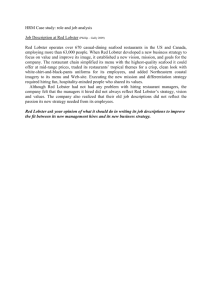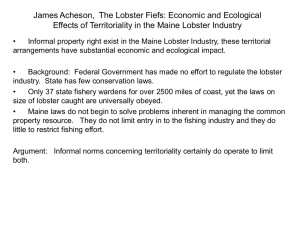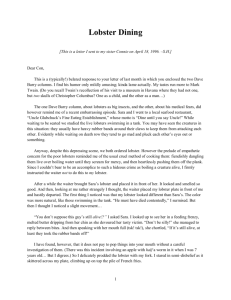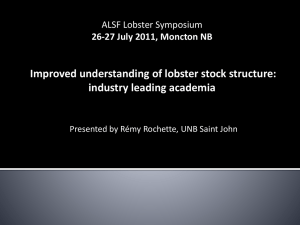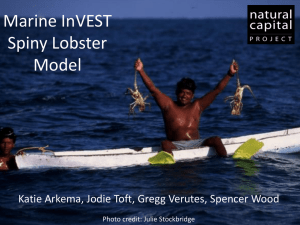Presentation on Lobster fishing in Atlantic Canada
advertisement
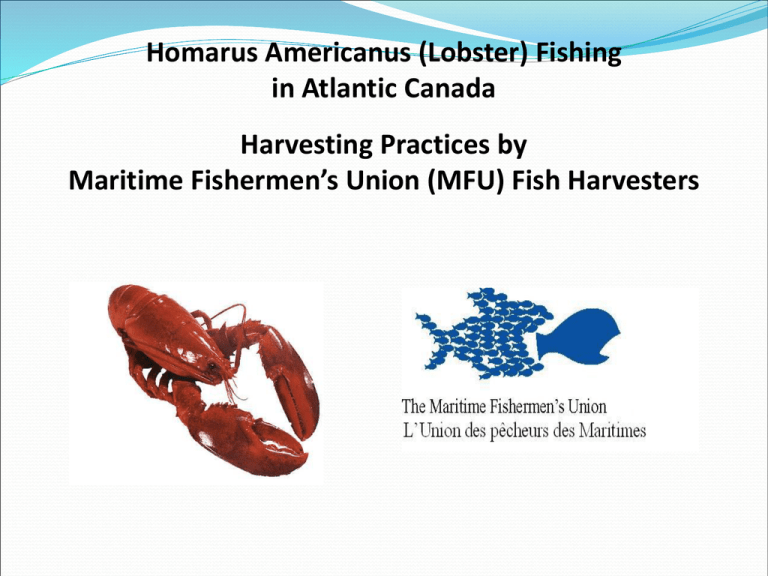
Homarus Americanus (Lobster) Fishing in Atlantic Canada Harvesting Practices by Maritime Fishermen’s Union (MFU) Fish Harvesters The Lobster Fishery in a nutshell • Lobster harvesters in New Brunswick and Nova Scotia own and operate their own fishing enterprise • Harvesters fish other fishing licenses, thus are multi-species fishers (i.e. herring, scallops, mackerel, etc.) •There are over 10,000 lobster harvesters in Atlantic Canada, creating employment for another 30,000 helpers and over 10,000 fish plant workers •1,500 of these harvesters are members of our organization (Maritime Fishermen’s Union - MFU) • Each boat employs an average of 2 helpers • Homarus Americanus fishing Areas (Canada and USA) in red • MFU Fishing areas indicated with blue arrows Boats are 45 usually feet in lenght made out of wood or more recently made out of fiberglass – this is a typical example of an MFU harvester lobster boat Older more recent traps Oldest traditional traps 捕捞龙虾的陷笼示意图 Modern lobster traps used most commonly today Hoop where lobster enter – also serves to eliminate the entry of larger lobsters Bait introduced into the trap to attract lobster Escape mechanism to let smaller lobsters exit the trap A great variety of bait in used to attract lobster into the traps such as herring, mackerel, plaize, etc… Traps are released and boeys indicate their whereabouts so they can be retreaved at a later date… The lobster boat has a series of tools crucial to its function – but none as important as the winch – used to lift the lobster traps into the boat A reverse view of the winch used to lift traps from the water as demonstrated here… We have ourselves one good sized lobster in a trap!! Before the lobster can be taken to shore, it must meet some legal size requirements – this is measured with the metal instrument depicted in this photo… The legal size of the lobster carapace is measured from the two points showed below… if the lobster is too small, it is released into the water immediately. Lobster claws are most commonly banded with elastics to avoid their use as weapons between themselves – this ensures better quality in the end Bands used usually give indications of where they were caught This is a female lobster with eggs attached to its tail. An egged female is immediately returned to the waters so it can hatch its eggs and bear small lobster larvae for future years. It is possible to tell if a lobster is male or female by checking under its tail… Modern technology is used for fishing and for safety purposes It’s supper time!!! Now this seems like one great treat! The clean blue seas where lobster fishing is a way of life… … and where not only harvesters can enjoy the benefits of the blue ocean… with beautiful beaches and recreational boating… This is our reality always near blue waters of some form and lots of it! … there is nothing quite like the feeling of taking on the ocean in a fishing boat as the sun shines on your face… We hope this presentation gives you a better idea of « one day in the life of an MFU lobster fish harvester ».
